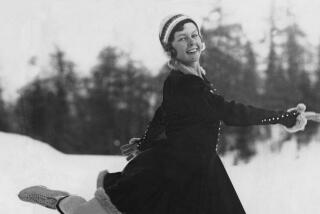COMMENTARY : The ’94 Lillehammer Games Provided So Many Memories
- Share via
The old man with a devil’s chin whiskers, Maurilio de Zolt, is an Italian cross-country skier who at 43 trains on wine and cheese, bread and wine, everything accompanied by wine. “It is difficult to say how many glasses of wine I had, and if I knew I’d rather not say it here,” he says, an eyebrow raised, “because I’d probably get in trouble with my associations.” Which prompts memory of Jean-Claude Killy’s line at Grenoble in 1968 when the Frenchman won three gold medals and defended his training regimen by saying, “Would you rather I not drink wine--and ski like an American?”
The last day of the Lillehammer Olympics, Maurilio de Zolt was seen with frost and ice clinging to his beard as billows of chilled breath preceded him through the forest that was the scene of the 50-kilometer race, the classic event of the wintry games. Spectators by the tens of thousands lined the route, most waving Norway’s red flag with the blue cross, children sitting in snowdrifts atop houses, everyone loving these moments that tell us the improbable is yet the possible.
Improbable that a bobsled would slide on Lillehammer’s ice under Bosnia-Herzegovina’s flag? And that it would carry four men, a Serb and a Croatian sitting around two Muslims? Here they were with brakeman Igor Boras saying, “Ten years ago, when we staged the Winter Olympics, Sarajevo was a paradise on earth for us. But it was blood red and a living hell when I left this time. We are showing to the Bosnian people and the world that we can live together.”
We will forget Tonya Harding as we forget all those who choose to betray their gift of talent. We will remember the Bosnians as we remember the old iceman, de Zolt, who chose to pursue excellence across mountains in three Olympics and finally won a medal, a gold as the leadoff man for Italy’s 30-kilometer relayers.
It is de Zolt of whom the Norwegian hero Bjorn Dahlie says, “I was impressed by him at the 1992 Olympics because, even then, he was old enough to be my father. No, I do not think I will ski that fast when I am 43 years old.”
We will remember the moments when these Olympics gave substance to words spoken in a Lillehammer house above frozen Lake Mjosa. The Russians rented the place with Reebok shoe money, apprentice capitalists learning from the masters. They laid on caviar in a room decorated with peasant shirts and silver samovars. There, the president of the Russian Olympic Committee, Vitali Smirnov, says sport is important: “It gives us optimism.”
As we leave the Russians’ house, an American reporter says, “You don’t believe anything that fat old souse said, do you?”
In fact, yes.
Granted, the Russian boss is a propagandist for his own well-being. Maybe he calls sport a source of optimism to justify his privileged life in a poor country so beleaguered that its existence is subject daily to whims of warriors, politicians and other madmen.
None of which changes the truth of what Smirnov says about sport. Anyone reaching for the stars lifts us all. Even the morning after the massacre of Israeli athletes and coaches at the 1972 Olympics in Munich, a Japanese coach said the games should go on. “There is more good here,” he said, “than criminals can erase.”
From these Norway games, we will remember Yi Qiabo, the star-crossed Chinese speedskater who, 28 years old with a bad knee, finished third to Bonnie Blair in the women’s 1000 meters and then, crying, says she cried not because of her knee but because she realized she would never skate in another Olympics.
“I feel very pain,” Yi says, “and I could not do my best on the last turn of my whole life.”
One last turn, or as American skier Diann Roffe-Steinrotter says, “The Olympics is one day, one hill, 1 1/2 minutes. Whoever shakes and bakes the best is going to get a gold medal.” One turn, one hill, a life’s work, the best of us reaching for the stars. And we will remember, always, Dan Jansen gliding in the starlight, his baby girl in his arms.
Johann Olav Koss is a Norwegian speedskating hero who set a world record in the 10,000 meters that may stand for half a century. He also won two other gold medals and there is talk of preserving his 1994 likeness in a statue that would grace the Viking Ship hall where he did his wonders. In his moment of victory, Koss announced what he would do with the $30,000 awarded him by Norway’s Olympic committee. He would send it to Sarajevo, where the need for money is desperate.
Perhaps other athletes made private donations. Of Americans, only Bonnie Blair revealed hers. She would give $5,000. Two seats away at a press conference, the new American millionaire Nancy Kerrigan did a recital of her soup contracts, shoe deals and sunglasses agreements before ending with a giggle. “So many,” she says. She offered the Sarajevans nothing.
We’ll remember Kerrigan in her golden glittery outfit on the night of her life. She skated as well as she can, good enough for a silver medal behind the Ukraine waif, Oksana Bayul, an orphan, only 16, a survivor of tragedies not to be confused with the inconveniences of a knee that is sore to the touch.
We’ll remember Oksana Bayul’s face when she first saw scores that celebrated her performance, scores that confirmed the reality of the improbable. Her face became a mask of tears. We’ll remember that her sorrow was not so far away that she could forget it in her moment of joy.
More to Read
Go beyond the scoreboard
Get the latest on L.A.'s teams in the daily Sports Report newsletter.
You may occasionally receive promotional content from the Los Angeles Times.






